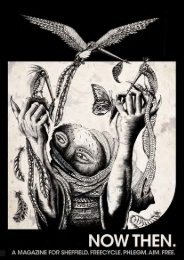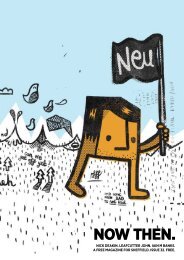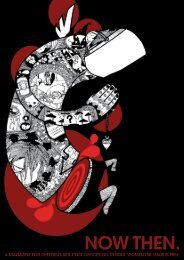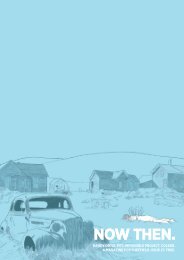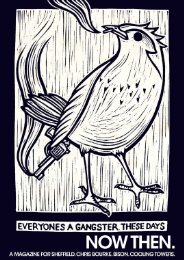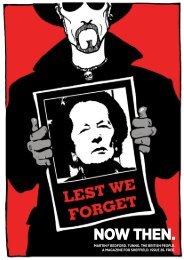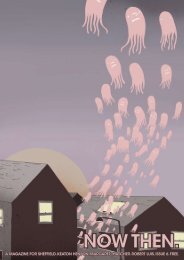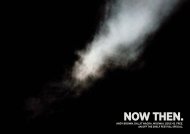You also want an ePaper? Increase the reach of your titles
YUMPU automatically turns print PDFs into web optimized ePapers that Google loves.
The words of the title are those of the<br />
inimitable Dr. Hunter Stockton Thompson,<br />
spoken of Johnny Depp’s performance in<br />
the film adaptation of Fear and Loathing<br />
in Las Vegas. For many, Depp’s role<br />
represents their singular impression<br />
of Thompson; that of a liquor-swilling<br />
acid fiend, grin-strapped and tiptoeing<br />
through psychedelic confusion, his<br />
cigarette holder pointing towards<br />
impending chaos. But he’s more than<br />
that, and with the latest in a string of<br />
documentaries chronicling his life set to<br />
hit our cinemas on Friday 19th December,<br />
it’s opportune to wonder: who was the<br />
Doctor?<br />
A Louisville-born freedom addict, Thompson’s<br />
contempt for authority coloured his existence.<br />
Barred from graduating at seventeen due to a<br />
vandalism charge, the military provided his ill-fitting<br />
alternative. Described by a Colonel as possessing<br />
“outstanding talent in his writing”, Thompson’s literary<br />
aptitude secured him a niche as Sports Editor for the<br />
base newspaper. There, his 20-coffee-20-hour days<br />
saw him shed pounds hunched over a typewriter.<br />
The journalism bug had bitten him; he had bought<br />
the ticket, it was time to take the ride. After leaving<br />
the army, he set his sights squarely on a career as<br />
a writer. But he became more than a writer: he<br />
became a generation’s custodian of the imperiled<br />
American Dream.<br />
Thompson broke his career riding alongside<br />
nationally feared outlaws in Hell’s Angels. Shortly<br />
after, in covering the Kentucky Derby for a monthly<br />
periodical, he unwittingly created Gonzo journalism:<br />
participant observation prose that vividly captured<br />
the yet-tangible vibrancy of the 70s. <strong>Then</strong> came<br />
“the Vegas book”, giving birth to Hunter’s popular<br />
identity. <strong>In</strong> ‘70 he ran for Sheriff of Pitkin County,<br />
Colorado on the ‘Freak Power’ ticket, pledging to<br />
legalise drugs and replace the streets with grass.<br />
He shaved his head in mockery of the Republican<br />
candidate’s crew-cut, referring to him as “my longhaired<br />
opponent”, losing by only a small margin.<br />
Politics was in his blood. Savaging Nixon in Fear and<br />
Loathing: On the Campaign Trail ’72, he later wrote:<br />
“I beat him like a mad dog with mange every time I<br />
got a chance.” Thompson’s similarly uncompromising<br />
political commentary made Rolling Stone magazine<br />
a household name and the voice of a youth skeptical<br />
of the social mainstream.<br />
Thompson’s iconic status boils down to this:<br />
he embodies the liberal ideal. The drugs, the<br />
motorbikes, the politics, the indefatigable scrutiny of<br />
authority, and the secluded farm in Aspen where he<br />
found his home: all these speak of self-determined<br />
individuality. His writings exemplify this. He was<br />
a compulsive mythomaniac. Gonzo, Fear and<br />
Loathing in Las Vegas, On the Campaign Trail ’72:<br />
all portray Thompson’s pseudo-ego, freed by his<br />
typewriter from the confines of reality, yet close<br />
enough to the true Thompson to inscrutably blur the<br />
line between character and author to his audience<br />
and to Thompson himself. Sadly, these confines grew<br />
increasingly real and, eventually, too much for him.<br />
His health was failing and his physical freedom being<br />
eroded by the inevitable decline of age. At 67, the<br />
Doctor exercised his final act of freedom, aided by a<br />
bottle of whiskey and a Smith and Wesson.<br />
Thompson’s loathing of the perversion of The<br />
American Dream was fuelled by this inescapable<br />
individuality and ingrained need for freedom.<br />
His perceptive, inquiring, aggressive cynicism<br />
found currency with a generation disenchanted<br />
by patriotic servitude. As one author put it: “He<br />
was a hypersensitive medium who channeled the<br />
underlying currents of truth, concealed in veils of<br />
silken lies that we have become accustomed to<br />
swallowing.” <strong>In</strong> an age where the mechanics of<br />
deceit pervade our lives in a multitude of forms, it<br />
is well we remind ourselves that unflinching rigour,<br />
rejection of unthinking conformity, and a passionate<br />
love of liberty are our greatest tools in divining truth.<br />
“Weird heroes and mould-breaking champions<br />
exist as living proof to those who need it that the<br />
tyranny of ‘the rat race’ is not yet final,” wrote<br />
Thompson. The answer to ‘who was the Doctor?’<br />
is contained in this sentiment. His legacy is a<br />
reminder of our capacity to live outside the bounds<br />
of conformity. Hunter reminds us that we can be free,<br />
but that this will challenge us at every step of our<br />
way. <strong>In</strong> an essay he wrote when eighteen, entitled<br />
‘Security,’ he leaves us to question for ourselves:<br />
“Who is the happier man, he who has braved the<br />
storm of life and lived or he who has stayed securely<br />
on the shore and merely existed?”<br />
‘Gonzo: The Life and Work of Dr. Hunter S.<br />
Thompson’ opens nationwide on Friday 19th<br />
December 2008.<br />
Find out more about Thompson at -<br />
gonzo.org.<br />
Read Thompson’s essay ‘Security’ at -<br />
ram.org/contrib/security.html.<br />
over a lost battlefield.<br />
PAGe fifteen.



